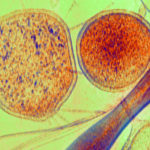By mining JGI’s massive database of microbial genomes and metagenomes, a team led by researchers at UC Berkeley and Berkeley Lab has identified a new family of CRISPR-associated (Cas) enzymes found in an ancient branch of the microbial tree of life. Just one-third the size of the seminal Cas9 protein – the business end of the gene-editing tool CRISPR-Cas9 – the new enzymes, dubbed Cas14, are the smallest functional CRISPR system discovered to date. Owing to its compact size and single-stranded DNA cutting activity, Cas14 may improve rapid CRISPR-based diagnostic systems now under development for infectious diseases, genetic mutations, and cancer.
Was this page useful?
Send




